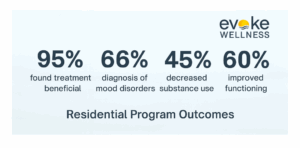Hearing you have both a substance use disorder and a mental health diagnosis can feel overwhelming. You might nod along as a provider explains the terms, but inside you’re thinking, How can I handle all of this? Maybe you worry about what treatment will look like. Maybe you’ve been told you need medication and the thought makes you tense up.
Dual diagnosis isn’t just a label—it’s a lived reality that can make every day feel like you’re carrying two invisible weights. But it’s also something that can be treated, and you don’t have to do it alone. A residential treatment program can offer the safety, structure, and integrated care you need to address both sides at once.
What Does “Dual Diagnosis” Mean?
Dual diagnosis, also called co-occurring disorders, means you are dealing with both a substance use disorder and a mental health condition such as depression, anxiety, PTSD, or bipolar disorder.
For many people, the two conditions are deeply connected. You might drink or use drugs to ease anxiety or numb emotional pain. Or, substance use may have triggered or worsened mental health symptoms you already had.
It’s not about one problem causing the other—it’s about how they keep each other going. Treating one without the other is like fixing a leaky roof without patching the hole underneath.
Why Residential Treatment Works for Dual Diagnosis
When you’re living with both addiction and mental health symptoms, outpatient therapy alone can feel like trying to balance on unsteady ground. You may have good intentions but still find yourself triggered by your environment, daily stressors, or cravings before the coping skills can fully take root.
In a residential treatment program, you live in a safe, supportive environment 24/7. This allows you to:
- Step away from the chaos and focus entirely on recovery
- Receive care from a team trained in both addiction and mental health
- Build structure and stability before returning to daily life
That separation from your triggers—combined with integrated medical and therapeutic care—creates a solid foundation for lasting recovery.
How Diagnosis Happens in Residential Care
Many people enter treatment unsure whether they have a mental health condition at all, or confused by past conflicting diagnoses. Residential care allows for a thorough evaluation over several days, not just a single appointment.
The process typically includes:
- Medical and mental health history review
- One-on-one conversations where you can describe your symptoms in your own words
- Observation over time, which can reveal patterns that short visits might miss
- Standardized assessments to provide clarity
This slower, more attentive approach helps ensure your treatment plan addresses the real issues you’re facing—not just the ones visible in a moment of crisis.
Integrated Care: Treating Both Sides Together
In the past, it wasn’t unusual for people to be told they had to “get sober first” before addressing mental health—or vice versa. But research now shows that treating both at the same time works best.
At Evoke Wellness at Cohasset in Cohasset, integrated care means your plan may include:
- Medication management to stabilize mood, reduce anxiety, or ease depression
- Therapy that addresses both triggers for substance use and mental health coping skills
- Group therapy where peers share strategies for living with dual diagnosis
- Wellness activities like mindfulness, art, or movement to support emotional regulation
When both conditions are treated together, progress feels more balanced and sustainable.
Addressing the Fear Around Medication
One of the most common fears we hear from newly diagnosed clients is about medication. You might worry it will dull your personality, change who you are, or create a new kind of dependence.
In residential treatment, these fears are met with conversation, not pressure. You’ll have time to:
- Ask questions about how medications work
- Learn about possible side effects and what to expect
- Try medications with close monitoring, so adjustments can be made quickly
- Explore non-medication strategies alongside medical support
The goal is not to make you someone else—it’s to help you feel steady enough to do the deeper work of recovery.
What Recovery Looks Like with Dual Diagnosis
Recovery from a dual diagnosis often means progress in multiple areas at once:
- Substance use becomes easier to manage as mental health symptoms improve
- Mood becomes more stable, making it easier to stay engaged in therapy
- Sleep, energy, and appetite begin to normalize
- The constant fight-or-flight feeling starts to fade
These changes don’t happen overnight, but each step forward builds confidence that you can live differently.
FAQs About Dual Diagnosis and Residential Treatment
1. Can I be treated for my mental health and addiction at the same time?
Yes—this is the cornerstone of dual diagnosis care. Treating both together prevents one condition from undermining progress with the other.
2. Do I have to take medication to be in a dual diagnosis program?
Not necessarily. While medication is often recommended for certain conditions, your care team will work with you to find a plan that feels right for you.
3. How long does dual diagnosis treatment take?
Many people start with a 30–90 day residential stay, followed by outpatient therapy. The length depends on your progress and ongoing needs.
4. Will my family be involved in my care?
If you want them to be, yes. Many programs offer family therapy or education to help loved ones understand your experience and support your recovery.
5. What happens after I leave residential treatment?
You’ll leave with an aftercare plan that may include outpatient therapy, support groups, or transitional housing to help you maintain progress.
6. Is dual diagnosis treatment more intense than regular rehab?
It can be, in the sense that it addresses more than one condition. But this intensity is what makes it effective—you’re building skills to manage both parts of your health.
7. Will I be with other people who have dual diagnosis?
Often, yes. Many programs group clients with similar needs together, which can help you feel understood and less alone.
Final Thought
A dual diagnosis doesn’t mean you’re broken—it means you’ve been carrying more than one challenge at the same time, often without the right support. In a residential treatment program, you can put both down long enough to catch your breath, get clarity, and start moving toward a life where stability and hope are part of your everyday reality.
Call 866-931-6429 or visit our Residential treatment program services in Cohasset, MA to learn more about how we support dual diagnosis treatment.





